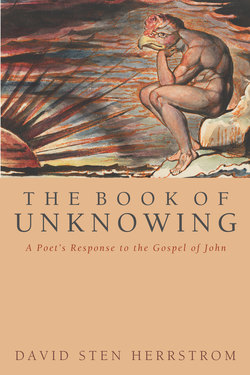Читать книгу The Book of Unknowing - David S. Herrstrom - Страница 16
На сайте Литреса книга снята с продажи.
Wind
ОглавлениеA wind of breath carries the voice. We can only “speak that we do know, and testify that we have seen” (3:11) by shaping the breath stream, which emanates from the literal and figurative depths of our being, into the sounds of words. Moving across the fields, words leave them “wind-addled and wind-sprung,” as Charles Wright says in his poem, “Night Journal.” A word pronounced is the public manifestation of a wind that swirls within us.
As the word spoken in the beginning resulted in the world, so the word carried on the breath stream creates new worlds. The spoken word is nothing less than the wind of creation, which poets have known from the beginning. Reminding us of this at the end of his book, John presents a striking act of Jesus. Appearing to the disciples after his resurrection, Jesus “breathed on them” (20:22). Power and intimacy combine in this moving gesture. It is the supreme expression of his presence both in the here & now and in the future, an affirmation that his creative spirit will remain with them after his departure, sustaining within them the new world he has made.
We detect here a whiff of the ancient Greek belief, rooted in an oral culture, that breath is all. It is consciousness, perception, and emotion. Breath constitutes the continuity of life itself. Seat of all the senses, the lungs, as the Canadian poet and Classicist, Anne Carson observes, are “organs of mind.” We are connected not only to one another but to the world by breath. A poet of our own day in a culture of the written word still feels this intensely: “Windblown we come, and windblown we go away,” the poet Charles Wright says, “All that we look on is windfall. / All we remember is wind.”
As breath asserts the continuous, it also erases discontinuities. Thomas’ thrusting hand and Jesus’ breath stream of words flowing into the ear of Thomas cross the boundary of flesh and self. Familiar outlines are erased in order that new outlines can be drawn in the imagination. The voice wind crosses all boundaries. “Breath is everywhere,” as Anne Carson reminds us, “There are no edges.”
In a pivotal passage, as Jesus attempts to make clear to Nicodemus the boundary between flesh and spirit, he evokes the wind. Choosing a stunning metaphor, Jesus says: “The wind blows where it chooses, and you hear the sound of it, but cannot tell from where it comes, and to where it goes: so is every one that is born of the Spirit” (3:8; NRS translation). Which Nicodemus hears as “The wind blows where it chooses, . . . so is every one that is born of the wind.” A natural interpretation, of course, because Nicodemus knows that in Greek the word for “wind” and “spirit” is the same (pneuma). He takes literally what Jesus intends figuratively. Later, Lazarus’ sister Mary will take figuratively what Jesus intends literally (11:24–25).
Like the wind, language slips and slides. It’s as if Nicodemus here assumes the role of the “keeper of sheep,” the speaker in a poem of Fernando Pessoa and the name that Jesus takes for himself later in John’s book. When a stranger maintains that the wind speaks of “memories and yearnings / And things that never were,” the keeper of sheep contradicts him, saying “You’ve never listened to the wind. / The wind speaks only of the wind. / What you heard it say was a lie, / And that lie is part of you.” The wind has no outline except what we give it. What Jesus draws is not what Nicodemus draws. A beautiful and moving image, the wind is also wonderfully and critically ambiguous.
Jesus’ words, therefore, undercut the very point he is making with Nicodemus. The image that Jesus employs at this crucial juncture in establishing the boundary between flesh and spirit is at the same time an image of boundary crossing. The categories of flesh and spirit dissolve.
The power of the wind asserts continuity, a world without edges, while Jesus ostensibly insists on discontinuity. These are no more firm categories here than they are at the end in the upper room with the disciples, where Jesus breathes on them in spirit and in flesh, and where Thomas violates the spiritual and material boundaries by a thrust of his hand. Nicodemus is perplexed (3:9) only because he sees continuity in the wind where Jesus sees outline.
